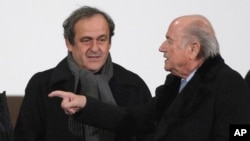Complaining that he is being “dragged through the mud” in the FIFA corruption investigation, Michel Platini believes he is “bullet proof” and has not lost support in his bid to replace Sepp Blatter as the head of world soccer's governing body.
The UEFA president, who has been suspended for 90 days along with Blatter, confirmed in an interview published Monday in the French daily Le Monde that he had no written contract for the $2 million payment he received from FIFA in 2011.
Risking further FIFA ethics sanctions by breaking confidentiality rules, Platini gave a detailed defense in the case that threatens to end his presidential hopes.
The extra pay for his job advising Blatter from 1998-2002 was “a thing between two men,” Platini said, giving a new version of why FIFA could not pay him in full more than a decade ago.
“I think it's shameful to be dragged through the mud,” he said, insisting the case was not a scandal.
Platini submitted his FIFA election application papers before being suspended and hopes that his provisional suspension will be lifted - by the FIFA appeal committee or Court of Arbitration for Sport - to allow him to run.
Platini must still pass an integrity check by FIFA's election committee, which will scrutinize all applicants after the deadline closes next Monday.
I don't think I've lost many votes and those who know me know I can look myself in the mirror,” Platini told Le Monde. “I'm bullet-proof.”
‘Gentlemen's agreement’
On Friday, Blatter told a Swiss broadcaster the payment deal being investigated by Swiss prosecutors as a “disloyal payment” from FIFA funds was a “gentlemen's agreement.”
Platini and Blatter are appealing the suspensions imposed this month by the FIFA ethics committee while it investigates the case.
The ethics panel has in recent cases imposed strict bans when soccer officials discussed their cases in the media.
“What annoys me most is to have been lumped in with the others,” said Platini, who joins a long list of past and current colleagues on the FIFA executive committee who have been implicated in corruption allegations.
Platini told Le Monde that Blatter, newly elected as FIFA's president in 1998, asked him to name his salary to work as a personal adviser.
“'How much to you want?' Blatter asks,” Platini told Le Monde. “I reply: ‘One million.’ ‘Of what?' ‘Whatever you want, rubles, pounds, dollars.' There was still no euro then. He replies, ‘Agreed. One million Swiss francs per year.’”
The former France great has previously said FIFA did not pay him in full at the time because of the governing body's financial problems.
Platini told Le Monde that Blatter suggested that FIFA's salary policy prevented him from having a contract that paid the Frenchman more than then secretary general Michel Zen-Ruffinen.
“I worked for several months without pay,” Platini said. “After a while, I go see Blatter: ‘You have a problem paying me?' He says: ‘Yes, I can't pay you 1 million because of the wage structure. You must understand that the secretary general gets 300,000 Swiss francs. You can't get more than three times his salary. So we'll write you a contract for 300,000 Swiss francs and pay the rest later.' And that's what happened. Only later never arrived.”
Platini said he invoiced FIFA for 2 million Swiss francs in 2011 because he mistakenly recalled that he had been paid 500,000 Swiss francs annually at the time, and not 300,000.
FIFA paid Platini in February 2011, weeks ahead of a presidential contest between Blatter and Mohamed bin Hammam of Qatar, who both sought Platini's endorsement.








